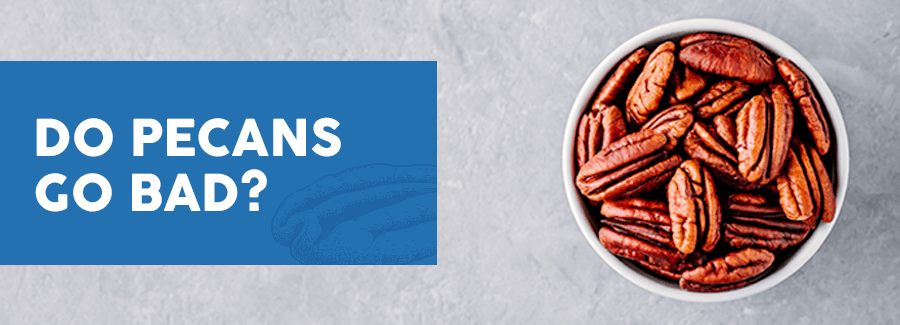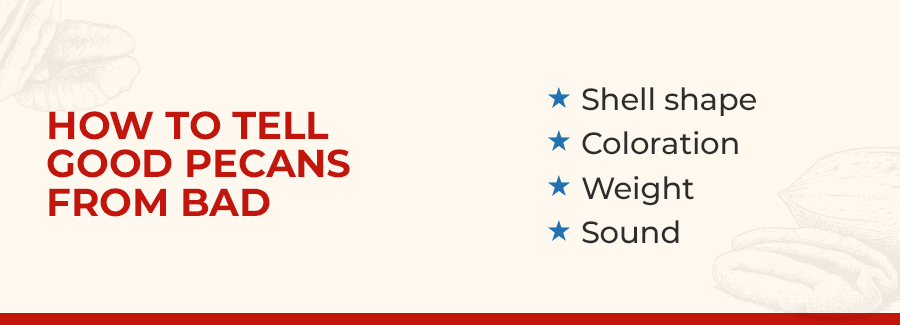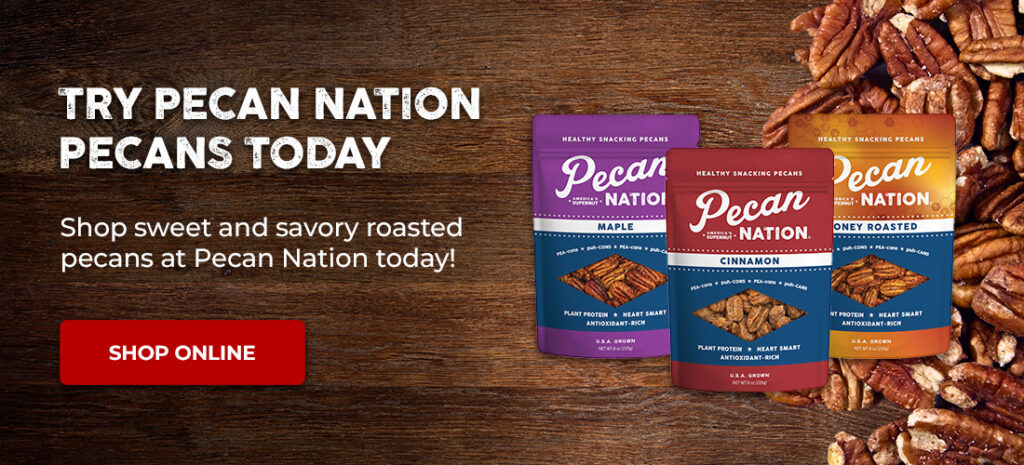
For many people, pecans conjure thoughts of decadent pastries, cookies and classic Southern pecan pie. However, pecans also make for a convenient and nutritious snack. They are full of magnesium, fiber and healthy unsaturated fats.
With delicious flavor, the highest amount of antioxidants and the lowest amount of net carbs per serving of any nut, pecans aren’t just an ingredient for your holiday cooking and baking. Families across the nation are wisely adding this nutritious, American-grown nut to their snacking rotation. If you plan to snack on pecans, you may be curious about their shelf life and the best practices for storing them.
Can Pecans Go Bad?
Yes, they can. Like most produce, pecans have a shelf life. Depending on how well you store them and whether they still have their shells, pecans can last for a long time. To maximize the shelf life of pecans, store them in a cool, dry pantry and keep them in airtight receptacles. Plastic bags, glass jars, reusable tin cans and other containers that lock out air are excellent choices for pecan storage.
Unshelled and shelled pecans last longer in the fridge and freezer because lower temperatures prevent the fats from spoiling. They also retain more flavor in these environments with their lower moisture levels.
How Long Do Pecans Last in the Shell at Room Temperature?
When protected by their natural shells, pecans generally last longer. Properly stored unshelled pecans can last for up to four weeks at room temperature. Store them in a low-humidity area with good air circulation to prevent mold, and regularly inspect your pecans to catch issues early.
Keep in mind you can’t shell all pecan varieties by hand. You’ll need to carefully use a pecan-specific nutcracker or hammer to get to the tasty snack inside.
How Long Are Pecans Good For? Shelled vs. Unshelled Shelf Life
Shelled and unshelled pecans last 9to 12 months in the refrigerator and about 2 years in the freezer. Store both types in a sealed container to provide another layer of protection from pests and humidity.
Keep in mind that whole nuts retain their taste and nutrition longer than nuts in pieces since less surface area is exposed to air. Roasting pecans may also decrease their shelf life because of the increased surface area for oxidation, but roasted pecans more than make up for it in convenience and flavor. You can add roasted pecans to salads, stir-fries, baked goods, ice cream and meat dishes. Best of all, enjoy pecans as an anytime-of-day snack.
Is Freezing Good for Pecans?
Yes, it is. Due to their low water content, freezing pecans is one of the best ways to store them. Roasted, salted or candied pecans also do well in the freezer, thanks to the extra layer of insulation. Freezing preserves their flavor and freshness when used sparingly. It also protects pecans from pests, humidity, heat and other factors that could cause them to go rancid or bad.
You can easily buy pecans in bulk and store them in the freezer for years as long as you follow best storage practices. When you take your pecans out of the freezer, taste them before snacking or using them for recipes to ensure they are still fresh.
How to Store Pecans in the Freezer
To keep your pecans safe in the freezer, store them in a freezer-safe plastic bag with all of the air squeezed out. Label each bag with the storage date. For extra protection, double-bag the pecans or place them in a freezer-safe storage container. Pecans are prone to absorbing smells and moisture while in the freezer, so storing them in a bag or bin will help them maintain their original flavor.
It’s best to store pecans in multiple recipe-ready bags or bins so you can defrost the amount you need. Separating the pecans into smaller bags can save you the hassle of defrosting them all and exposing them to temperature fluctuations.
How to Defrost Frozen Pecans
Defrosting pecans is simple. Leave them on the counter until they reach room temperature. Use them promptly after thawing and avoid leaving them on the counter for extended periods. Avoid microwaving pecans to defrost them, as it can reduce their freshness and flavor and give them a chewy texture.
Defrost the pecans right before you want to eat them or use them for cooking. If you happen to defrost them earlier than you need, you can place them in the fridge to maintain their freshness. They should keep their flavor for two months after defrosting.
You can also re-freeze them, and they will still retain their taste for the next time. Remember to re-freeze them immediately after using the amount you need.
How to Tell Good Pecans From Bad

Knowing how to tell if pecans are good or bad can help you select nuts that may last the longest with proper storage. It may not be obvious, as there are several factors involved in choosing the best pecans. Like many naturally grown foods, pecans are susceptible to pests, fungi and damage from harvesting and handling. To enjoy the best pecans, keep these factors in mind:
- Smell: Bad pecans produce a rancid odor and may smell like other absorbed scents. In contrast, good pecans will have that pleasant, buttery, nutty scent you love.
- Shell shape: As pecans grow, they form inside the husk as nutrients travel through the husk and shell. Dry weather, low-nutrient soil and insect damage are all possible interruptions to this growing process. When a pecan hasn’t grown properly, it tapers toward the tip end, so look out for this visual sign of a bad pecan.
- Signs of mold and insect growth: Examine shelled pecans for a powdery substance, which could indicate mold growth. Mold is typically black, white, gray or green, so look out for that, as well. If pantry moths have affected your pecans, you’ll see webbing on the surface. Discard the nuts if they show any of these signs.
- Coloration: High-quality pecans should exhibit a smooth, uniform color. Certain varieties of pecans, such as Stuarts, show stripes near one end of the shell. For these striped varieties, look for a clear definition between the color of the stripe — black or very dark — and the light tan color of the pecan’s shell. Consistent color and definitive stripes are both excellent indicators of quality pecans. For shelled pecans, you can recognize a good batch if it has a golden or light brown color. Avoid shelled pecans with discoloration or dark spots.
- Weight: A good pecan bears a hefty weight relative to its size. If a pecan feels light and unsubstantial, it probably doesn’t contain a quality nut.
- Sound: You may not think sound plays a role in identifying a good pecan, but it can. High-quality pecans will sound solid when rattled together or dropped. In contrast, bad pecans will sound hollow because the nut inside hasn’t completely filled out. To pick good pecans by ear, try shaking them in your hand to listen for the right sound.
- Texture: Good shelled pecans feel firm and solid, while bad pecans are soft, oily, sticky and shriveled.
- Taste: You can differentiate between bad and good pecans through your taste buds. Bad pecans have a bitter, sour, “off” flavor and foul aftertaste, while good pecans are decadent with nutty, buttery notes. It’s best to avoid tasting pecans if they don’t smell right to begin with.
- Expiry date: The “best before” or “use by” dates of packaged pecans indicate product quality. If the expiry date has passed, the pecan quality may have declined. Most foods are generally safe to eat after the expiration date if you followed best storage practices. Check the smell and appearance to see if your pecans are OK to eat.
What’s the Proper Way to Store Pecans?
Delicious, healthy snacks sometimes require a bit more care than quick-and-easy, processed options — but it’s worth the effort. By learning what to avoid when storing pecans, you can have this tasty, nutritious snack ready to enjoy any time:
- Keep pecans away from moisture: To prevent discoloration, molding and breakdown of the oils inside pecans, store them in a low-moisture environment. In-shell pecans may start to darken in color when stored amidst high humidity.
- Store pecans in cool, dry places away from heat and light: Because pecans contain such a high amount of healthy, plant-based oils, they are prone to going rancid if they spend too long in warm temperatures and areas with direct sunlight.
- Protect pecans from strong odors: Shelled pecans are prone to absorbing unwanted odors. Nearby vegetables, fruits and even paint or wood may end up affecting the taste and quality of your pecans. Be sure to keep pecans in clean, airtight containers to maximize their shelf life.
- Avoid constant temperature fluctuations: To maintain pecan freshness and quality, avoid repeated thawing and freezing, which could happen with power outages, frequent door opening and door seal issues.
Try Pecan Nation Pecans Today
Pecans are a delicious, nutritious and convenient snack to enjoy at any time of day. If you’re looking to add healthy fats, fiber, vitamins and minerals to your diet, consider pecans. They’re more than just a baking ingredient or salad topping. At Pecan Nation, we offer USA-grown, non-GMO pecans for all your snacking needs. Shop sweet and savory roasted pecans at Pecan Nation today!

